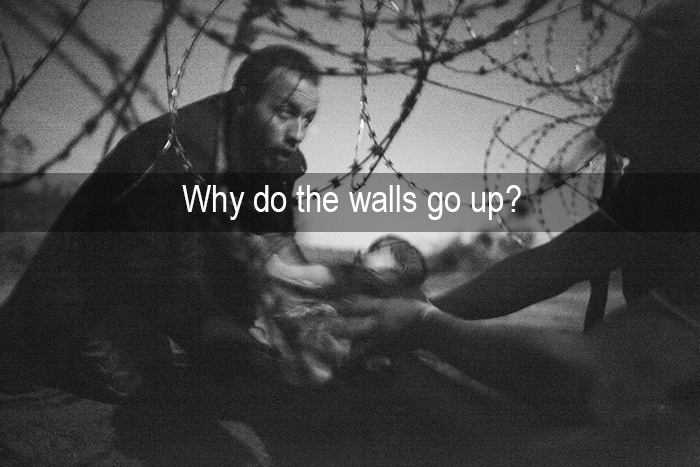
World Press Photo of the Year 2016, Warren Richardson
The word crisis makes its way into every speech, public or private. It is as if you are to get used to it, like being in a swamp in which you cannot move. Of course, it is only the one who has money and power who will be able to do so. The economy is in crisis, but the word crisis goes beyond the economy; it invades the affective and social spheres. There is crisis in the family, society, school, the relationships of couples. The relationships of people to each other is also in crisis.
Its hostage
You fall into the net of trivialization. You are in danger and in danger there exists the law of “every man for himself” or even worse, “my life is what matters whether you die or live, I don’t care”. The walls go up, psychological and real. Fear drives thoughts and ideas. Even those who do not cry out against foreigners, and the ones who fought racism until today, put up barriers and recite a litany of clichés: “we are not so well, what do they want here, we can’t accommodate all…” One cannot deny the complexity, the situation is dramatic; one cannot define the situation with prepackaged theories. The numbers speak for themselves: in 2015 at least 3,771 people died in their effort to reach Europe. Of those, 700 were children.
The indifference of those who govern
The European governments have actually driven over one million of people into the hands of the traffickers and onto the overcrowded boats directed towards Europe. Europe is becoming more and more a fortress. It does not offer alternatives to crossing by sea; barbed wire has been stretched along the borders. There are cumbersome reception procedures. Bringing about change at the level of the European Union takes a long time and does not meet the immediate needs of the Middle East, North Africa and the African sub-Saharan countries. This is the true cause for migration: people are in need of protection because they are fleeing wars, extreme violence and persecution.
Kilometers of Walls
The number of the anti-immigration barriers in the world has grown steadily; from 1945 to today they are at least 50. For example, between the United States and Mexico a wall of 1,050 kilometers was erected in 2006. Ciudad Juarez, the last stage of the journey of Pope Francis in Mexico, is the emblem of this closure. The “separation barrier” built along the West Bank of Israel measures 700 kilometers as of 2012. Saudi Arabia is also constructing a wall with Iraq and another with Yemen. Morocco constructs walls at the borders of Algeria, while for decades a wall has been erected by the Moroccans in the West Sahara. India has sealed the border with Bangladesh. Spain has its barriers with a height of three to five meters constructed in the enclave of Melilla, at the boarder of Morocco. In recent months 175 kilometers of barbed wire fence was put up in Hungary. These walls are not built as a border of jurisdiction but have come to be created as de facto borders. Proponents of a free market support the free movement of goods and capital but do not extend this openness to people. Concerning their effectiveness, the walls only hold off people temporarily, if at all. In the long run, the walls become politically cumbersome and enlarge the sense of injustice. Certainly, they are not a sign of liberty, friendship and solidarity.


